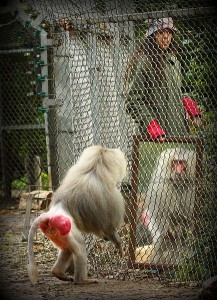Eat. Drink. Excrete. Sleep. Repeat.
We humans often reduce the lives of animals to these common processes. However, scientists in recent decades have broadened the horizons for animals by looking into their ability to self-recognize.
Developed in 1970 by psychologist Gordon Gallup Jr., the mirror self-recognition (MSR) test has been the most common method of testing animals’ awareness of themselves. The test entails the placement of a red spot on a sedated animal in a location which the animal cannot see without a mirror. The spot must be smooth and odorless as to not excite any olfactory or tactile cues. Once the sedation wares off, the animal is presented with a mirror. If the animal makes a movement towards the red spot, the test makes the assumption that the animal recognizes itself. Most species tested have failed the MSR exam with only great apes, an individual Asiatic elephant, orcas, dolphins, and Eurasian magpies passing as of 2016.
Baboon observing itself during MSR test by Moshe Blank, source
However, the “red spot” test has come under scrutiny with many scientists claiming that it is not a true indicator of self-recognition. For the exam to be applicable, one must make the assumption that animals know the reflective properties of a mirror, an object which they may have never seen before. Additionally, many animals (especially wild one’s) do not have a clue as to what they look like as an individual. Rather than visuals, they can often recognize certain smells and sounds. Marc Bekoff, professor emeritus of ecology and evolutionary biology at the University of Colorado Boulder, conducted “yellow snow” experiments in which he deducted that his dog Jhetro could recognize its own urine and would respond differently when presented with the urine of other dogs. “Animals such as Jethro may fail the red dot test but still possess some sense of self or ownership over their body and smells.”
Strengthening the case against the MSR test, naturalist legend Charles Darwin claimed in his theory on evolutionary continuity that the differences among species come in degree, not kind. This means that if humans are self-aware creatures, other animals are most likely self-aware as well but to a different extent.
Although animals may not have the same reaction when looking into a mirror as humans do, most creatures understand that they possess their own body which does not belong to another. For example, animals must know the placement of their bodies in space to effectively navigate as a pack or flock. Lastly, one can look to his/her four-legged friend on the floor to see how animals display ownership over food, territory, family, and body parts with which they associate.
So, can animals really recognize themselves? Yes, they can. Just not always in the same ways humans do.
This area of research opens up the gates to even more complicated questions about animals. How do different species think and feel? How do they grapple with emotion?



evansymes
This is a very interesting and well written post on a subject that has been debated for basically as long as humans have been humans. I recently listened to a podcast titled “The Secret Intellect of Animals” which was one installment of the show “Stuff to Blow Your Mind” – http://www.stufftoblowyourmind.com/podcasts – In which the hosts dicussed whether animals are sentient, self-aware beings, like we humans are, or if they’re automata: robot-like beings, as Descartes famously opined. Central to this debate is the idea of ‘human-exceptionalism’ which is the idea that humans believe themselves to be unique, special creatures that are different from all other life. This idea contrasts with the notion that animals are sentient and self-aware and so many people throughout history automatically presume that no other animals share our self-awareness. However as more testing is done on the subject we are beginning to learn that some animals definitely are self-aware to a degree, like some primates and dolphins, but it’s hard to be sure. The podcast is focused on work done by Dutch-American Primatologist Frans De Waal, and the final point made is that with our current technology and research methods it is impossible to determine for sure exactly how much self-awareness animals have, however, most animals are not the robotic automata that descartes described.